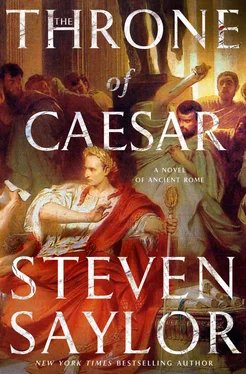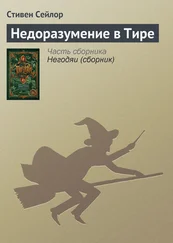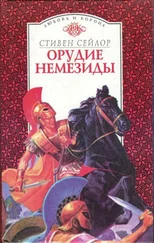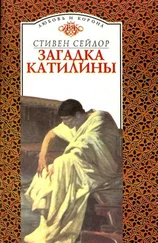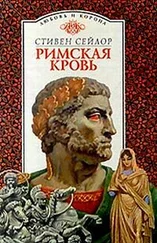Стивен Сейлор - The Throne of Caesar
Здесь есть возможность читать онлайн «Стивен Сейлор - The Throne of Caesar» весь текст электронной книги совершенно бесплатно (целиком полную версию без сокращений). В некоторых случаях можно слушать аудио, скачать через торрент в формате fb2 и присутствует краткое содержание. Год выпуска: 2018, Издательство: St. Martin's Press, Жанр: Исторический детектив, на английском языке. Описание произведения, (предисловие) а так же отзывы посетителей доступны на портале библиотеки ЛибКат.
- Название:The Throne of Caesar
- Автор:
- Издательство:St. Martin's Press
- Жанр:
- Год:2018
- ISBN:нет данных
- Рейтинг книги:5 / 5. Голосов: 1
-
Избранное:Добавить в избранное
- Отзывы:
-
Ваша оценка:
- 100
- 1
- 2
- 3
- 4
- 5
The Throne of Caesar: краткое содержание, описание и аннотация
Предлагаем к чтению аннотацию, описание, краткое содержание или предисловие (зависит от того, что написал сам автор книги «The Throne of Caesar»). Если вы не нашли необходимую информацию о книге — напишите в комментариях, мы постараемся отыскать её.
The Throne of Caesar — читать онлайн бесплатно полную книгу (весь текст) целиком
Ниже представлен текст книги, разбитый по страницам. Система сохранения места последней прочитанной страницы, позволяет с удобством читать онлайн бесплатно книгу «The Throne of Caesar», без необходимости каждый раз заново искать на чём Вы остановились. Поставьте закладку, и сможете в любой момент перейти на страницу, на которой закончили чтение.
Интервал:
Закладка:
Having seen the gardens, and having seen the Seven Wonders in my youth, it seemed to me that Antony was engaging in a bit of hyperbole.
“I wonder if Cleopatra is aware of this news?” said Cinna in my ear. “She’s made herself so at home there, one might think she’s taken up permanent residence.”
“I suspect the queen will be out of Rome quite soon, if she hasn’t departed already,” I whispered back. With Caesar dead, what exactly was the status of Cleopatra, who occupied her throne thanks only to the judgment of Caesar? And what was the status of the son she claimed to be Caesar’s? If there was any provision for either of them in the will, Antony did not reveal it.
Antony continued. “But as amazing as that gift may be, it pales beside another provision of the will. To every citizen of Rome, without exception—to those of you who loved him, to those who did not, it doesn’t matter—Caesar leaves to each and every one of you the sum of three hundred sesterces.”
This drew gasps from many in the crowd, including myself. Rumors had suggested that the populace would benefit from Caesar’s will, but none had put the figure so high.
“So much?” I muttered.
Cinna raised an eyebrow. “His fortune was immense. As was his generosity.”
The weeping grew even louder. “Beloved Caesar!” wailed some, and others, “Father of the Fatherland!”
Antony again motioned for quiet. “How could our inheritance, yours and mine, be so great? Consider his achievements—the lands he conquered, the gold and silver he brought back to Rome, the income from so many provinces and colonies, all accomplished for you and in your name, the Senate and the People of Rome. Father of the Fatherland you called him, and yes, like a father he provided for his family. For you new roads were built, reaching to every corner of the world. For you new temples were constructed, lavish houses for the gods, who in return lavish their blessings on Rome. For you were constructed whole new treasuries to contain all the wealth he brought back to this gods-loving, gods-beloved city. You made Caesar master of the legions. He made Rome master of the world.”
Antony looked toward the shrine and the covered body. “And now … now he lies dead.”
“Show us!” cried someone. “Show us the body!”
Antony stepped toward the shrine. For a moment I thought he intended to pull the couch from the shrine, yank the purple-and-gold cloth from the body, and lift Caesar in his arms, so that all could see the corpse itself. What effect would the sight have on the crowd? Instead he shook his head, then turned and raised his hand, palm toward us, as if to reject the pleading of the crowd. “The widow has asked that the body not be displayed, and we will respect her wishes.”
He continued with a summation of Caesar’s life. A family history and list of offices are typical of eulogies, but Caesar’s biography was anything but typical. As Antony sped though the details, I was struck by just how extraordinary Caesar’s life had been. Was he really descended from Venus, as Antony reminded us? Whether born with divine blood or not, Caesar had crisscrossed the world, from Britain to Egypt, from Spain to the Parthian borderland, overcoming every obstacle and conquering all that he encountered.
Antony spoke briefly of the civil war, though his descriptions of events did not quite match my own memories. “None but the Gauls had ever dared to march on Rome and conquer the city, many generations ago. It was Caesar who pacified the Gauls once and for all. Yet even while he was busily occupied in that virtuous endeavor, certain parties here in Rome made evil use of his absence and ventured on many odious schemes, so that we came desperately to long for his return. And so, abandoning fresh victories within his grasp—otherwise all of Britannia would be ours today—Caesar rushed to our assistance and quickly freed all Italy from the dangers that threatened. When he saw that Pompey, who had abandoned his country and was setting up a kingdom of his own, transferring all the wealth of Rome to Greece and Asia, using your own money against you, Caesar at first did his best to persuade Pompey to desist and to change course, sending mediators to him privately and publicly and offering solemn pledges of peace. When Pompey refused all entreaties and cut all ties with Rome, even the bond of friendship that existed between himself and Caesar, and chose to fight against you—then and only then, at last, was Caesar compelled to begin the civil war.
“But what need is there to remind you how daringly he sailed against Pompey in spite of the winter, or how boldly he assailed him, though Pompey held all the strong positions, or how bravely he vanquished him, though Pompey’s troops, gathered from all Asia and Greece, were vastly greater in number? I saw! I was there that day in Pharsalia, fighting beside Caesar. With my own eyes I saw how great was Caesar’s military genius. The Great One, Pompey called himself, but Pompey was shown to be a mere child, so completely was the great general outgeneraled at every point.”
I thought this dig at Pompey might draw some ire from the crowd, but the people surrounding me appeared to be partisans of Caesar through and through. If there were supporters of Pompey or Cato among us, they made not a peep of protest.
He spoke of Caesar’s virtues, which went far beyond his military genius: the keen intellect that allowed him to master every situation; the shrewd insight into other men’s characters that made him such a natural leader; the piety that made him so eminently suited for the office of Pontifex Maximus; the generosity, of which the citizens of Rome on this day were but the latest recipients; and above all, Caesar’s tendency to be merciful and to forgive.
“What other man, having achieved by military might the defeat of all his enemies, ever showed such clemency toward the defeated? Yet Caesar always showed mercy to those who opposed him. Even to Pompey he would have issued a pardon, had not the Egyptians killed him first. Think of the mercy he showed to so many men who joined with Po mpey’s cause and then, bested by Caesar, had every reason to think that Caesar would put them to death. But did he? No! Quite the opposite. He welcomed those men back to Rome with open arms. He gave them back their houses and their estates. He allowed them to return to the Senate. He even appointed them to high office. In return they took a solemn vow to keep him safe from all harm. If some were ungrateful, if some broke that vow, Caesar was not to blame, though you see before you the price he paid for their ingratitude.”
“Miserable wretches!” cried someone, and another, “He should have chopped off their heads while he had the chance!”
Antony waved for silence. “Has any man in all of history ever been so great, not just in power but in spirit? Think of this remarkable fact, that in the case of virtually every man who ever achieved so much power, that power only served to reveal and foster his weaknesses. The more powerful such men became, the more selfish and petty and decadent. Yet in Caesar’s case, the exact opposite was true. Every increase in his authority only served to increase his virtues. The more powerful he became, the more virtuous he grew, until, at the end, can anyone deny that he was by far the best among us? Warfare did not brutalize him. Good fortune did not corrupt him. Power did not pollute him. Those things only made him greater of spirit, wiser, more merciful, more just. What an extraordinary man! More than a man! Who can doubt his divinity?
“And yet—this Father of the Fatherland, this Pontifex Maximus, this inviolable being, this hero, this god … is dead. Dead! Not taken from us by disease, or wasted by old age, or brought low by witchcraft. Nor was he wounded in warfare, fighting on your behalf in some distant land. No, he died right here within the walls of this city, the place in all the world where he should have been safest. He is dead by violence, because of a plot against him. He was ambushed in the city he loved, murdered in the chambers of the Senate—the man who was building for us a far more splendid new Senate House at his own expense.
Читать дальшеИнтервал:
Закладка:
Похожие книги на «The Throne of Caesar»
Представляем Вашему вниманию похожие книги на «The Throne of Caesar» списком для выбора. Мы отобрали схожую по названию и смыслу литературу в надежде предоставить читателям больше вариантов отыскать новые, интересные, ещё непрочитанные произведения.
Обсуждение, отзывы о книге «The Throne of Caesar» и просто собственные мнения читателей. Оставьте ваши комментарии, напишите, что Вы думаете о произведении, его смысле или главных героях. Укажите что конкретно понравилось, а что нет, и почему Вы так считаете.
